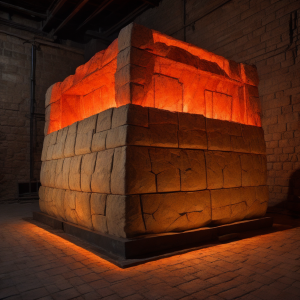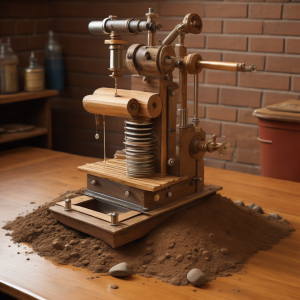When Genetics are Unkind
Humans, when they arrived in Arrhynsia, were quite familiar with magic. According to very early human records from the first landing in
Portsend, their ancestors had been manipulating their world with the power of possibility for hundreds of years before the leylines in
Eryia became fouled and the humans were unable to use them.
But human magic is not like the magic practiced by native Arrhynsian mages, for humans have no magic themselves, they must use magic tools. Humans lack a
Magei System, and thus cannot perform magic without implements to extract magic from the world, store it, shape it and release it. This is not as much a liability as some would assert, as it has been the incentive for humans to develop a great many magical items which make our world much more comfortable and safe than it would otherwise be. Further, the development of magical implements leads to much more widespread use of magic, and makes that magic accessible to a great many more people - one no longer has to be or hire a specially trained healer to get healing - one can simply consume a healing potion that is specific to your ailment. It is true that the healing potion is costly, but it is not nearly as costly as the services of a healer used to be, and it is much more widely available. Thus, the general levels of well being and economic and social prosperity that used to be available only to elves and dragonborn (who breed true for magic abilities), is now available to races that do not reliably produce people with
magei systems.
The lessons of human use of magic are not lost on the native-born mages of Arrhynsia. Not more than three hundred years into the First Wave, Arrhynsian elven and dwarven mages were studying and collaborating with the humans at the
The University of the Arcane. That collaboration came to an abrupt end when the human mages at the University cast a spell that caused the
Cataclysm. By then, however, the basics of wizardry had been codified and spread beyond the borders of the human kingdom - a fortunate circumstance given the complete devastation the Cataclysm made of humankind and their continent.
The Basics of Wizardry
Magic, of course, is the quality of what
is to
become, in other words, magic is potential, and it is found in everything. The theory of affinity postulates that this potential (or magic) has a current state dictated by it's source and characterized by two measureable features, inertia and correspondence. Magic can be separated from stuff or what some term "matter" (pun intended) such as stone or water, or "states" such as fire or cold or wind. Leylines, of course, are areas in the accessible universe where magic is easily harvestable from it's source, and for wizardry, access to a leyline is critical for keeping the cost of magic items affordable.
There are four problems in wizardry which must be solved, and which represent the four steps to create a magic item. These steps are: Extraction, storage, formulation, and use. We will discuss each and give a brief overview of important points. Full mastery of the topic requires years of study, but the basics are within the grasp of most sentients.
Extraction
Extraction techniques vary, but the core of the process is an ineffecient distillation and filtration technique which first loosens the potential from a magically charged material, then separates it from the host material, and distills the resultant product from the separated substance to concentrate it sufficiently for use.
The specifics of the process vary and depend on the type of magic being extracted. Matter based magics are fairly straightforward. For stone magic, the raw stone must be ground and mixed with an acid, then heated and the cooled in a distillation process. For water magic the water must be acidified, then filtered, then distilled. State based magics are more tricky, and the method of extraction is centered around changing the state of the subject and capturing the magic as the state releases it. This typically is a filtration process for which there are significant trade secrets and patents.
The process of magic extraction can be extremely dangerous when conducted at any industrial scale. In a miniature context however, the process can be managed very safely for matter based magics such as stone or water magic. For matter based magics, the residual material from the process is not completely devoid of magic, and it can be returned to the place of origin. For state magics, the state is completely lost, having released it's magic completely, though only a fraction of the released magic is captured. The biological processes which process state type magics are much more efficient than current state of the art mechanical extraction techniques, and many sorcerers (who have a
Magei System) use state magic regularly as their "instantaneous" magic source.
Storage

by Terry Cassis using Imagine AI
Once magic elixr has been extracted, it needs to be stored until use. This is an extremely tricky process, because magic elixr is highly reactive with many substances, particularly other types of magic elixrs. Typically, for most storage applications on an industrial scale, containment that aligns to the affinity of the magic extracted is used - for example, stone magic elixr is stored in stone vats. Fire elixr is kept in stone vats which are temperature controlled, while cold and water elixr are typically co-mingled and stored in giant temperature controlled stone vats lined with ice. Stone works well for containing most types of magic elixr because of it's high degreee of magical inertia and low degree of correspondence with transitory effects.
For wind, an affinity neutral substance is required to form the containment and storage vats for this elixr. There are very few naturally occurring affinity neutral materials, but certain types of white porcelain clay have this property. In the
Northern Wastes there were two locations where this clay could be mined, however both are covered in hundreds of sheets of ice deep in the heart of the continent, and are therefore inaccessible today. The main continent of Arrhynsia has only one known location for this affinity neutral clay located at the White Hills of Breshnok, on the cliffs overlooking the saltwater bay shared between the Human Kingdom and the Land of the Short. Affinity neutral clay is in very high demand and is extremely expensive as it is a key component in certain rechargable magic items as well as the only multi-purpose material for the storage of magic elxir.
Magic elixrs can be stored for periods up to a year before formulation or use. They dissipate quickly if not kept in very specific conditions and shelf life can be measured in minutes if not stored properly. Storage is typically done in separate containers as uncontrolled combination of magic elixrs of different origins can be highly explosive.
Formulation & Use
The current field of formulation is where most wizards focus their attention, and where most patents are applied for. There are three classifications of formulations: integral magic items, limited/rechargable use items, and spells. All magic items must be sufficiently robust to both contain the magic elixr that charges them and fulfill the purpose of the magic. The type of magic elixr used in a magic item or spell is also important as the magic itself has decided affinities for certain types of magic - what is easy and natural for it to become (correspondence) and how easy it is to release it from it's current condition (inertia) and the similarity in permanence of the desired end state of the magic to it's initial temperament.
Certain magic items are charged with magic during their manufacture - magic weaponry is typically (but not exclusively) of this type. The magic is used during forging and enhances or modifies particular properties of the weapon making it exceptionally suitable for use. For example, a magic sword might be embued at its forging with a characteristics of lightness which makes it exceptionally easy and quick to maneuver. The magic used for these types of items is expended during the manufacturing process, and no maintenance or invocation of the magical properties of the item is required. The user needs no specific training, skills or abilities to use these items.

by Terry Cassis using Imagine AI
Other magic items actually invoke some sort of magic effect when used. Typically these types of items require magic when manufactured in order to establish the correct preconditions needed to result in the desired magical effect. This type of magic item also contains a reservoir which is filled with magic elxir which is dosed out across a limited number of uses at the time of use. Some items can be recharged and used again up to the number of charges allowed by the reservoir, others are disposable and self destruct or simply become mundane tools when their magic is expended. Typical magic items of this type are self propelled vehicles, direction finders, washing machines magic wands or staffs, and healing potions (which are strictly single use items). Small scale magic extraction systems can be purchased for incredibly expensive prices which will collect magic for rechargable items. These "rechargers" will invariably produce only a single type of magic, typically stone magic as it is the easiest and safest raw material for a typical random person to collect and process. It is also possible to purchase extracted elxir from magic item merchants in major cities and from traveling wizards. The users of these items needs no specific training, skills or abilities to use them.
The third type of wizardry magic is a spell, and it's use is what people typically think of when they refer to wizards and wizardry. Spells are a patented series of instructions which are recorded in some medium, typically a scroll or spellbook similar to the function of a cookbook in culinary pursuits. Spells are flexible - that is the tools of the spell are not single purpose and can be applied to different desired outcomes, and can be tailored by the spellcaster if the wizard is sufficiently knowledgable. Spells are very slow to invoke compared to magic item use, as the setup for the spell execution is not preformulated, and can be time consuming and labor intensive to perform.
Spells invariably utilize some sort of containment mechanism such as a ritual circle or vessel to focus the magic and apply the directions/conditions for the spell. The wizard sets the conditions and direction for the spell within the containment prior to invokation. The spell is invoked when magic elixr is added to the containment and the conditions as established by the wizard are able to direct the magic into accomplishing the desired end state of the spell.
There are tall tales of spells that actually invoked by reading a spell, but this is an old wife's tale - or
Sorcery which is a completely different type of magic altogether. Spell books are typically not magical in and of themselves, and spells are not invoked by reading a scroll or waving hands or speaking magic words which are all actually useless when working with wizardry spells, but are often used to disguise the actual effective components of a spell by some wizards.
Spells are never sold or given or transferred in any way to anyone who does not have a license to practice magic. Spell casting is extremely formulaic and follows precise formulations that are calculated using a system invented by
Linus Dalton and published early in his career. Failure to be precise and accurate in creating or executing a spell often end in explosive and deadly consequences for the spellcaster and those in close proximity to the spell. Spells are written in an arcane formulatory language used to keep those who are not qualified from trying to execute the spells as they can be quite dangerous. Typically, the calculus used to derive the formulation of the spell is not recorded with the spell in a spellbook in order to discourage experimentation.
Training and Ranks of Wizards
Extensive training is utterly necessary to create new spells and magic items, but the operation of magic items and even many of the pieces of the execution process for manufacturing magic items does not require advanced magical knowledge - or even any magical knowledge at all. Apprentices learning basic wizardry magic are referred to as magic workers. Journeymen wizards have gained mastery of the arcane languages of spells and gained familiarity and basic competence with spell use can execute some parts of the magic spell creation processes and execute difficult spells themselves without supervision. Persons with this level of skill are referred to as Spellcasters. Promising journeymen go through a process of qualification and certification and taught the magic calculous skills to be able to invent new spells and magical items, and are referred to as Doctors of Wizardry.
Dark Magic
There are two state magics which are used in the practice of sorcery by those with
Magei Systems, namely life and death. These are not ethically available to humans in their practice of wizardry as in order to extract magic from a state, the magic worker must change the state of the subject. For the states of life and death, the techniques needed require sacrifice of life, typically sapient life or the raising of undead. Both are abhorent, and condemned by all sentient species and governments, at least officially. Nevertheless, "Dark Mages" do exist, namely because the magic elyxir that is generated by these practices is increadibly intense and has unique properties of inertia and correspondence. These Dark Mages, the most famous of whom was Dark Mage Torrington and his horrific staff
Soul Eater, are terrors in the communities in which they live. The
War of the Eternals, was an attempt by the celestials to stomp out this abhorent practice which was successful, but not without ramifications.

Comments